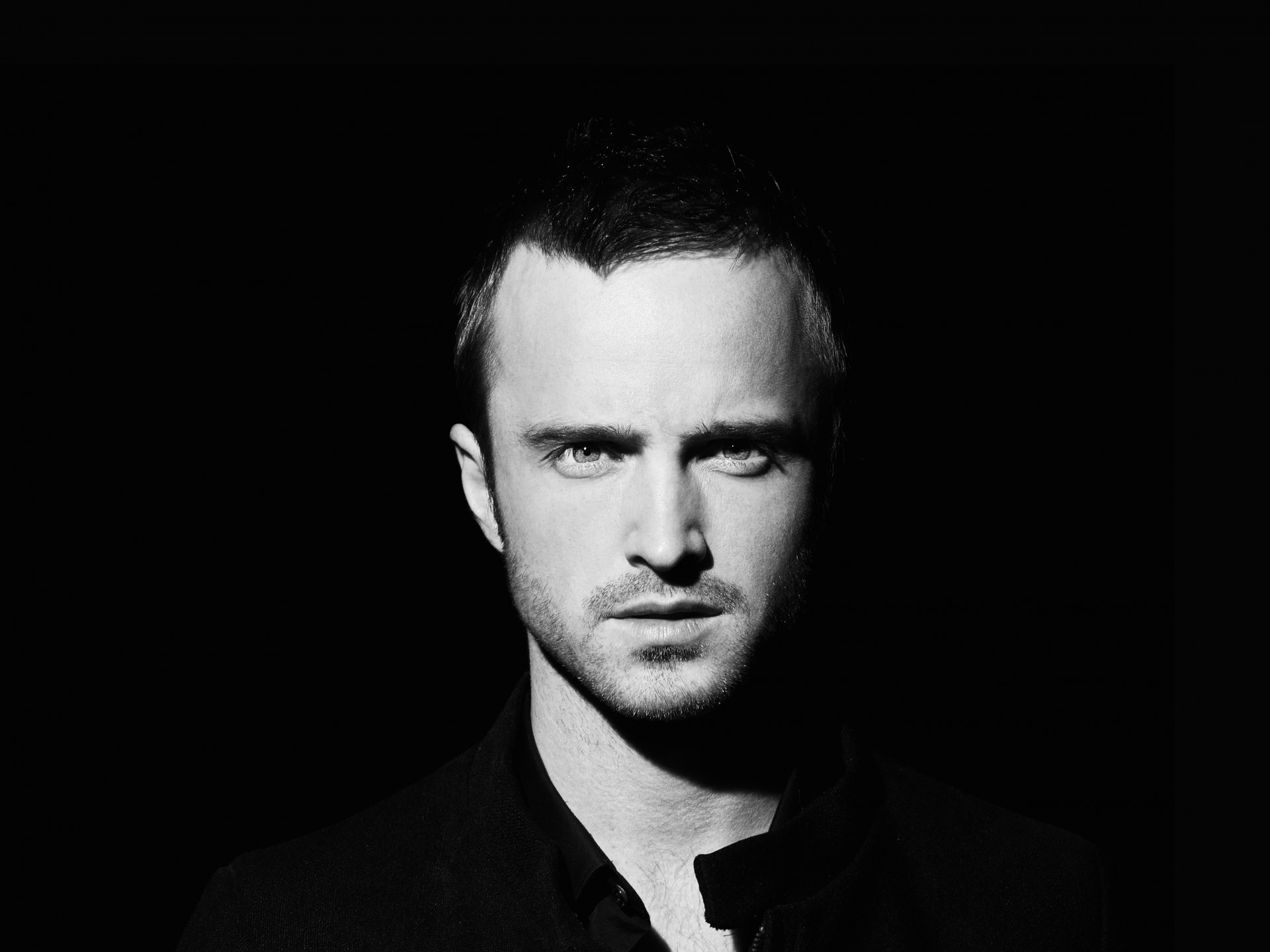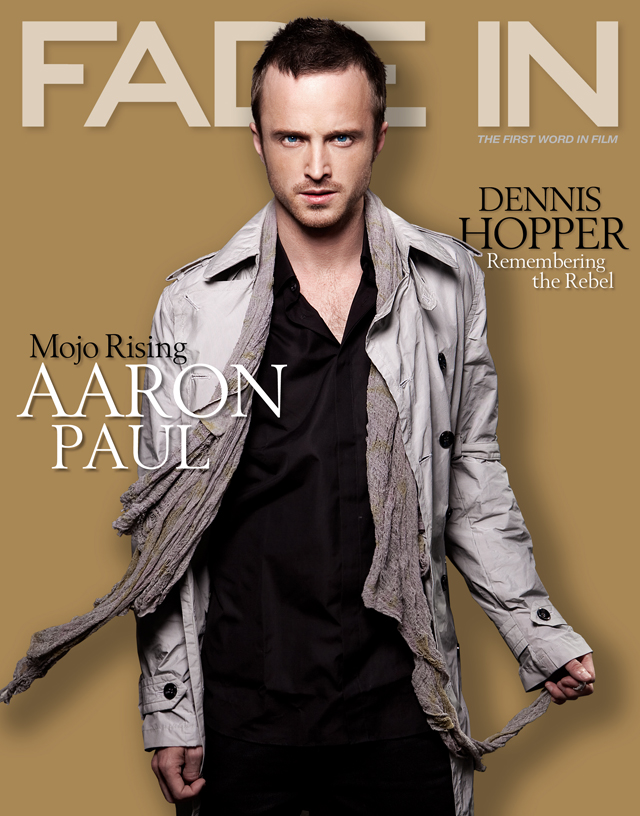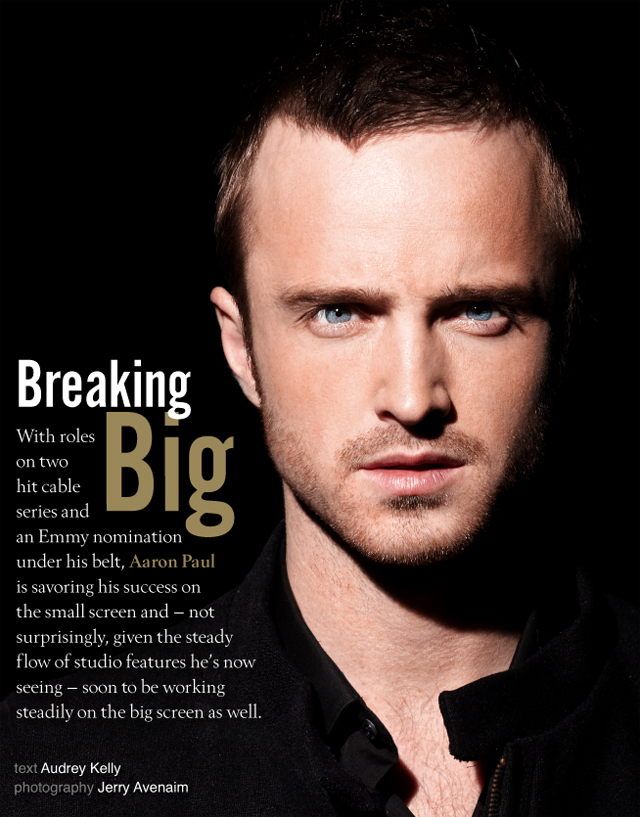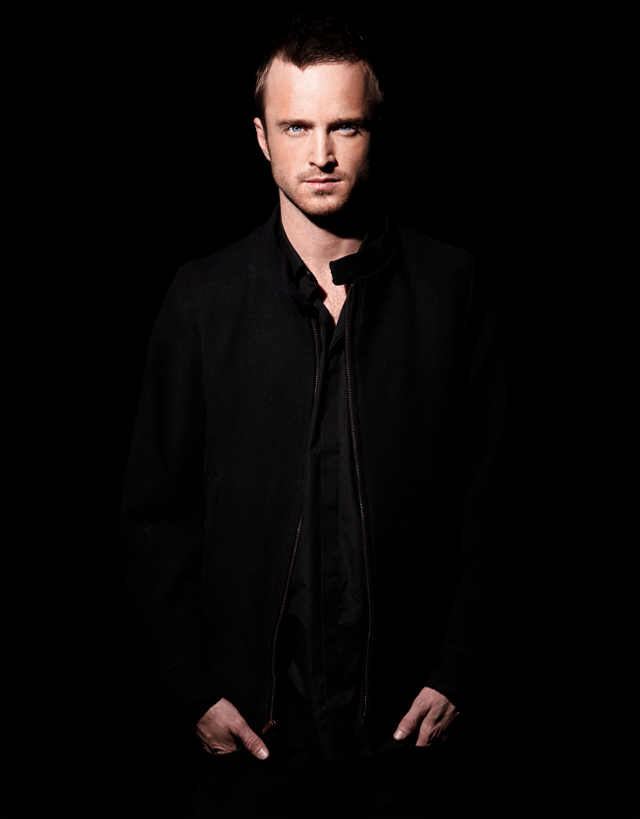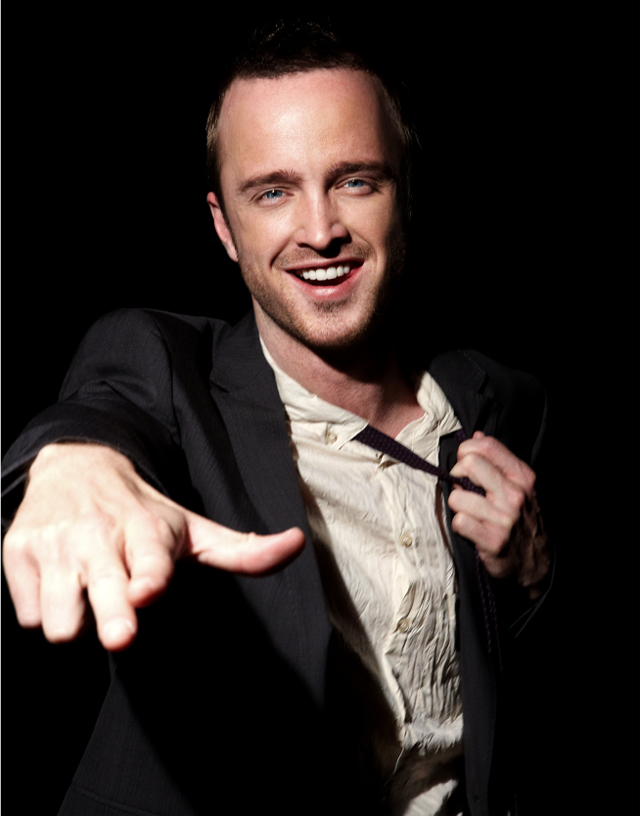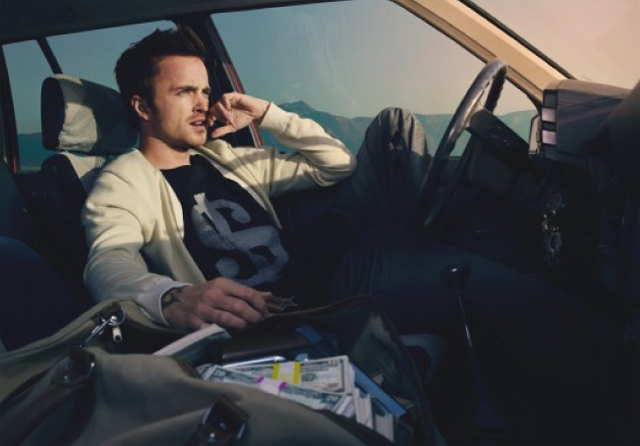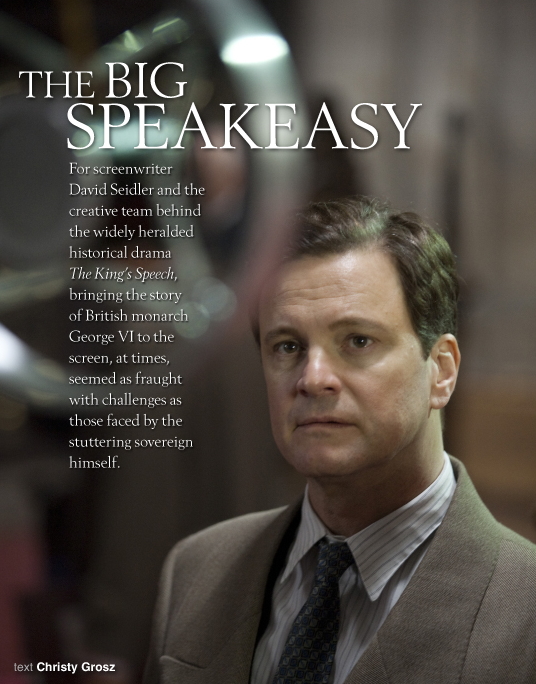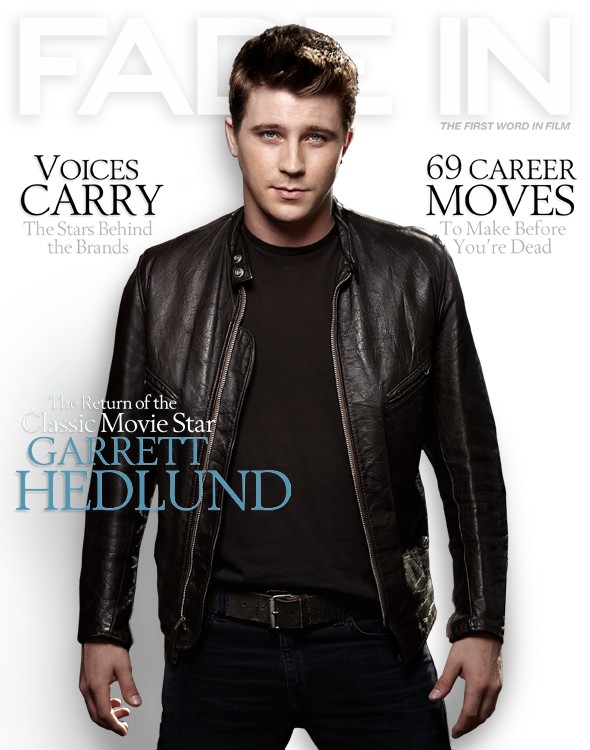If the opportunity to play a wide range of characters is an actor’s dream, then Aaron Paul may be the envy of every young actor in Hollywood. After all, the easygoing Idaho native has spent the past two years juggling roles on two of the most acclaimed drama series on cable television. On AMC’s Breaking Bad, he’s Jesse Pinkman, a ne’er-do-well druggie who introduces his former high-school chemistry teacher, played by Bryan Cranston, to the crystal-meth trade; and on HBO’s Big Love, he’s Scott Quittman, a straight-laced Mormon who marries Sarah, played by Amanda Seyfried, against the wishes of her polygamist parents.
In part, Paul was able to draw on his own life experience in his approach to the characters; his father is a Baptist minister who was once a member of the Latter Day Saints church, and, while he does not use drugs, he has occasionally crossed paths with those who do. But the reason his performances resonate so deeply may be as simple as the fact that, even though Scott and Jesse are at opposite ends of the moral spectrum, Paul portrays them without judgment and invests them with humanity. The result: even wayward Jesse, whose meth activities surely ruin lives, somehow manages to elicit concern and sympathy among regular viewers. OK, his riveting blue eyes may help, but still…
Although Paul has been working for more than a decade, his industry heat has been a long time coming. As a kid in potato country, he always gravitated toward creative pursuits, and as soon as he scored his high school diploma, he moved to Los Angeles on his own at seventeen, determined to make it as an actor. Following a slow but steady path, he advanced from commercials to guest spots on dozens of TV series, including Beverly Hills 90210, Melrose Place, The X-Files, NYPD Blue, ER, CSI and more than a dozen others. He also starred in a music video for the band Korn and turned up in features like K-PAX, Van Wilder and Mission: Impossible III.
Even though Breaking Bad creator Vince Gilligan intended for Paul’s character to die in the first season, he fought hard to cast him as Jesse, because at first AMC thought Paul was too WB. But the antagonistic rapport between Paul and Cranston (think The Odd Couple’s Felix and Oscar cooking meth in a ramshackle RV somewhere in the New Mexico desert) proved so appealing that Paul not only earned a reprieve, he became an essential part of the show, and last year earned an Emmy nomination for his performance.
“Aaron’s very much a chameleon,” says Gilligan. “He can be Jesse Pinkman on Breaking Bad and then he can be a completely different character on Big Love. He understands intuitively what every scene requires. He understands it with a minimum of direction and a minimum of explanation. He’s a natural, a true actor who has a long career ahead of him.”
Now, with his success on a pair of boutique cable favorites, Paul is receiving more substantial feature offers. But so far, no doubt because he knows how hard he worked to get here, he is being cautious. “I really believe that if you want some sort of longevity in this business, it’s all about picking the right roles,” he says.
During his Fade In interview, shortly before he was set to head out of to the desert for the Coachella Music Festival, he happened to make the acquaintance of one of his avowed heroes, an Oscar-winning screenwriter with one of the most distinctive voices in the business. Who knows what the future will bring?
You’re on two series that are considered to be among the best on cable, Breaking Bad and Big Love. Numerous critics have said that most current cable series are better than ninety percent of the features being made. Do you agree? And if so, why do you think that is? I do. It’s hard for me to be engaged in films lately. It’s very strange. With Breaking Bad, for example, when I first read the script it was like nothing I’d ever read. I honestly didn’t think AMC would pick it up because it was nothing like you see on TV. It’s almost too brave, in a sense. This was before Mad Men had come out, and I didn’t know AMC was really doing original programming other than this test show. I’m like, “Is this really how they’re going to push the AMC name?” But you see these [Breaking Bad] scripts, and you watch [the show] and it’s like you’re watching a Coen brothers film each week. It’s so rare to find something that is so on the page, and with Breaking Bad and Big Love, it’s so on the page week to week to week. These shows just constantly push the envelope, and being on cable allows them to do that more. With network shows they’re a little more timid, a little more scared to go out there.
Less honest? Less honest. Exactly. These scripts are so genuine and honest. Yes, they’re out there, but these stories are very real and alive. For example, meth is a huge, huge problem in this world, but a lot of people are scared to tell that story. When we were shooting the pilot [for Breaking Bad], there was a principal arrested for selling meth to his students in Arizona, the bordering state to New Mexico. It was so strange, life imitating art, because the show is about a high-school chemistry teacher going through the worst midlife crisis and making very bad decisions, but for the right reasons, and so he teams up with some of the students who cook and sell meth in order to provide for his family in case he dies. It’s very brave, but these stories are very honest.
So many of the films coming out aren’t as good because they’re afraid to tell the truth. The more truth they tell, the better, because people can relate to it, and they can respond to it and it’s not all about the big blockbuster explosions. It’s more about telling it from the heart, even though that may be hard to do at times. With these shows, if the audiences are brave enough and strong enough to go through these roller coaster emotions with these characters, it’s very satisfying. These characters go through a lot of heartache, a lot of torture, but there are glimmers of hope. The audience goes through these emotions like these characters do, and they want to root for these characters and pull for them.
“The week I moved out here, two block from my place, there’s a Bank of America getting robbed by four guys with machine guns. And here I am, seventeen years old, my mom hears this on the radio and she says, ‘What? There is no way I’m leaving my son here.’ But she did.”
“I met Spike Jonze in New York and he said, ‘Charlie Kaufman is the biggest fan of [Breaking Bad].’ I was like, ‘No way!’ He is so brilliant. That’s the type of writer I am obsessed with. Eternal Sunshine of the Spotless Mind is so good. I’m all about coloring outside the lines.”
Like when your Breaking Bad character Jesse schemes to buy his parents’ house from under them. Exactly! When Jesse took back what was rightfully his. I applauded when I read it.
Were you at all apprehensive about taking on the role of a drug dealer? Not really. It was hands down the best pilot I have ever read — possibly the best thing that I’ve ever read, to be honest. The only apprehension I had was, I didn’t know if it was going to go. I just wasn’t sure if AMC was brave enough to tell a story like this. And AMC actually got a lot of criticism. People would say, “Shame on AMC and Sony for glamorizing crystal meth,” but this was before the show aired. The fact of the matter is, it is not glorifying crystal meth at all. It’s showing the raw honest truth of what this drug does to people and what it does to people around them. I don’t think anyone would trade their lives with these characters, especially with Walt and Jesse. It would completely turn their lives upside down.
Have you run into any meth dealers since the show has been on? [Laughs] Quite a few. A lot of recovering addicts have come up to me. It’s so crazy. They instantly feel connected to me, or really to the character. An example: these two guys from New York, who were addicts for sixteen years, were childhood friends who started using at the same time. They had this chemical romance. And they gave me this big hug and said, “This just reminds us of why we’re clean. We applaud you for doing the character justice.” That’s the biggest compliment ever. All I want to do is be true and honest to that world.
You didn’t train to become an actor. What introduced you to your method of preparation? The only thing was there was this Shakespeare festival. I loved it, but in high school I was the theatre kid. I had three different jobs, and I went to school a class early so I could graduate early, did theatre right after class. I didn’t really have a life. I just worked and did theatre. That’s the only training I had. When I got out to L.A., I audited some classes — three very different classes. But each class I sat in on, I didn’t get what they were trying to convey. Maybe it helps with other people. How I approach acting is, you’re not yourself, you are a completely different person. It’s a different skin, and you just have to live those emotions. That’s probably what they’re trying to teach in these classes, but they did that with these random exercises, like games, I just didn’t get. They’d say words back and forth, back and forth. I just didn’t understand it. I would go, “Why don’t they just morph into these characters?” If you’re morphing into these characters, it’s not about what you’re saying; it’s about listening and what the other person is saying. I didn’t respond to it, so I did it on my own.
So do you have your own method of preparation? Just be the person. [Laughs] It’s all different. I always try to do roles that scare me a little bit, that are not like me. It’s easier to zip on a different skin than try and play someone like myself. That’s probably the scariest thing to do — to play someone like yourself. Rather than you showing up on set and you’re someone so far from yourself — that’s what is so exciting to me. The character-y roles, that’s what I want to do.
You come from Small Town, USA. How long did it take to adapt to the wilds of Hollywood? [Laughs] It took a minute to really understand. Coming from Idaho to L.A.… I lived in California when I was younger, then back to Idaho, but I never really understood what it was like to live in a giant city. I remember the week I moved out here. Literally two blocks away from my place, as I’m setting up my apartment, there’s a Bank of America getting robbed by these four guys with machine guns. No joke. Two blocks from my house. And here I am, seventeen years old, my mom hears this on the radio — she was helping me get set up here — and she says, “What? There is no way I’m leaving my son here.” But she did. It took me a minute to get into the city and into the business. I got a manager and an agent right away. It took about eight to nine months to get work, so I was able to quit my day-to-day [job] and concentrate on acting. [There were] definitely roller-coaster highs and lows. But it’s been good, especially lately. I haven’t stopped.
Do you go back often? I try to get back three or four times a year. I have a huge family.
How do the folks in your hometown treat you now? A lot of people watch the show. I get a lot of support, and then I get a lot of people who don’t want to support me.
That’s odd. Why do you think that is? I don’t know. It’s so weird. So strange.
Maybe they think you’re actually a drug dealer? I don’t know. I definitely have more people on my side.
When will you know if you will be reprising your role on a next season of Big Love? Obviously, Amanda Seyfried’s schedule got busy with features. They told us early on if it works out with our schedules… Amanda said she wants to come back. I would absolutely love to come back, and they said they’d love to have me back, so maybe during a holiday, like Thanksgiving, they’ll have our characters come back and visit the family. I love them all over there. Amanda is so sweet and so honest and such a brilliant, young, beautiful actress.
“This business can be very dangerous to young kids coming out here with the dream. Fame changes people. How can it not? But I’m thirty years old, and have a grasp of who I am, but when you’re seventeen, you think you know everything, but you truly are an infant, still very much learning.”
Are you OK if it ends here? Absolutely. Yeah, yeah, yeah. It’s definitely one of those bittersweet things, but I had a fun ride with it, and all good things do come to an end. And it’s a little tough with Breaking Bad because, like last season, we started shooting the exact same day, and one shoots in L.A. and one shoots in New Mexico. So I’m happy either way. If I do come back, then great. If not, then great. I got great relationships out of it.
Is it true on both Big Love and Breaking Bad your characters weren’t supposed to have lasted more than one season? Yeah, it’s crazy. Big Love started before Breaking Bad, and it said, “possible recurring.” And the role just grew. Scott and Sarah, they started this love connection, and he instantly wanted to help her because she wasn’t really feeling the whole polygamy lifestyle. They started dating, then they were engaged, now they’re married, and now they’ve moved away. It’s weird. They just kept having me back. And I thought once Breaking Bad got picked up, Big Love would be done, and so did Big Love. They were trying to figure a way to end the relationship, and they actually did end the relationship with Scott and Sarah. But I just stayed in contact with HBO and some of the producers there. I said, “Breaking Bad is totally open to me coming back if you can work it out with the schedule.” They were like, “Really?” So they [raised] my character from the dead again, and brought me back, and we got back together, fell madly in love and got married.
And the same thing happened with Breaking Bad? Same thing happened with Breaking Bad! I didn’t know this when I got hired. And I’m glad I didn’t know this, because I would’ve been devastated. Truly, [I’m] so lucky. But Jesse [originally] was going to die during the first season. Toward the end of the season, Vince [Gilligan], our lovely creator, was having a lunch with the writing staff, and he waves me over and says, “Listen, I want to tell you what we were talking about. I wasn’t going to tell you until we were done shooting…” And this was episode five or six of the first season. “I wanted to let you know what we were planning to do with your character…” “What’s that?” And everyone is looking at me, and they’re all smiling. “Well, originally Jesse was going to die at the end of the first season.” And we still have two more episodes to shoot, so I’m like, “What? What are you trying to say?” He says, “No, it’s not going to happen anymore. We love what you’re doing. We love the constant tug of war, butting-head odd-couple relationship that Walt and Jesse have, and we’re going to keep that very much alive.” I was so happy that they decided to go that route instead of putting Jesse six feet under.
The whole next season, everybody teased me, “Did you read the next script? I’m so sorry.” “What do you mean? I haven’t read it.” “Oh, uh…never mind. It was really a pleasure working with you. We think you’re really great. Good things are going to happen for you.” They were messing with me constantly.
You’re busy with Breaking Bad for a good part of the year, obviously, but still have time to do movies. Yet you’ve been offered a lot of high-profile feature projects and turned them all down. Why? There’ve been some big studio films that have come my way that I just didn’t think were the right direction for me to go in. I really believe that if you want some sort of longevity in this business, it’s all about picking the right roles. Finally, this is the first time in my career I’m able to work [based on] the roles, and not to survive, so I’m just trying to be picky. I just want the right project. I’d rather not work than work on something that I’m not so unbelievably excited about. Maybe that’s the wrong choice, but I don’t really care [laughs], to be honest. I just want to do something, even if it’s just a small little indie, that really makes me excited, that’s very story-driven, character-driven and doesn’t need those big explosions or car chases.
We won’t see you playing a superhero? Maybe. Who knows? Depends if it’s a really cool, interesting character. We’ll see…
When you do choose a project, do you normally read a script and then have an instant visceral reaction? Yeah, I do. It’s so hard for me to pick up a script and read it straight through. You can tell if it’s a good script three pages into it, really. Maybe it doesn’t start off that quickly all the time. There’s an instant connection. If I don’t have an instant connection, it’s very hard for me to be convinced to have that connection. And there’s definitely a lot of convincing going on…with whether or not my manager/agents think I should do a particular project…even with, for example, The Last House on the Left. I originally passed on it because I was like, “Why are they remaking that movie?!” I hadn’t even read the script, but then, out of the blue, the casting director called me, and then the producer, whom I’d never met, called me on my cell and said, “You just need to watch this director’s last film, Hardcore.” They sent it over to me, and I watched it that night. Ten minutes into it, I completely saw a whole new vision of what I thought Last House could be with this director’s vision in mind. And his film is brilliant, and he’s a brilliant director, so I’m every happy that I ultimately made that decision. I’m so, so proud of that film. It’s a very artistic, fun, crazy, dark film.
What made you say yes to Wreckage? I met the writer [David Frigerio] randomly in Norway, and he didn’t even know I was an actor, but I knew he was a writer. We started hanging out. There was a huge group of us there, hanging out for two weeks. Then he called me weeks later, after I got back to L.A., and he said, “You’re an actor.” I’m like, “Yeah.” “You’ve done a lot of stuff. Why didn’t you tell me?’ “Well, I don’t go around spouting out my resume to everybody, you know?” He said, “There’s a script I think you’d be great for. I’m not reinventing the wheel on this one, but if you want to help put it together, let’s do it.”
So I read it, thought it was a fun, interesting piece of material, so I thought, “Why not?” This was like four years ago, way before Big Love. Actually I got Big Love the day I got off the plane from Wreckage. He was like, “Do you have any friends that would like to do it?” I called my friend Cameron and asked if she’d like to work on this film with me. So I began to piece it together myself, really. Got a bunch of my friends involved, we stayed in this beach house together in North Carolina. Had a good time. It was fun. Shot BB guns at each other.
You’re currently developing a project of your own called “Bone Orchard,” which Amanda Seyfried is attached to. Why come onboard as a producer in this instance? It’s a great, honest story by Elizabeth Wilder. It was originally a play that she adapted as a screenplay. I’m trying to put this whole thing together. It’s the first project I’m taking on full force by producing, coming up with a list of directors and casting. It’s exciting. It’s fun having these conference calls and meetings about it. I’m a little out of my element, but that’s exciting to me. I know how it works. I get it, but it’s weird being on that side.
Will you also star in it along with Amanda? Yes.
Do you find a lot of the material you get now is to play drug dealers? Oh, yeah, yeah, yeah. It’s so funny. They see that you can do that, they trust in it. And they’re like, “Well, maybe he’ll do it again…” But [right now] I just want to do something different.
Who came up with the Weird Al piece for Funny or Die? Ah, man. Mike [Ferra] from Funny or Die contacted Bryan Cranston and I to go take a creative meeting with him because he wanted us to do something together. So we went in there and pitched ideas back and forth…such great people over there… We were going to do something on Octomom when she was really in the press. [Laughs] It was actually Bryan’s idea: “What if I play Octomom’s vagina, and we’re throwing a press conference…” And then they came up with the idea, “And then Aaron could play her clitoris and he can have a little flower hanging off his head…” It was actually really funny.
“The casting couch is still very much alive. [It] should be completely eliminated from this business. It’s not going to happen, but it’s one element I’d like to change. I probably shouldn’t say that to the industry, because they know that it’s very much alive.”
Sounds like they’re smoking something over there… They all are constantly, obviously. I mean, look at their videos. But it ended up not happening because she fell out of the spotlight, which was so shocking. They knew that I was a fan of their spoof of fake trailers, so Mike contacted me: “Hey, we’re working on this idea, the rise and fall of Weird Al Yankovic. We’d love for you to play it.” So I said, “Once you get some sort of a script, let me know.” And they sent me this five-page concept script and said, “If you have any ideas, please let us know. We’d love for you to do it.” So I read it and thought it was brilliant. We tried to do this a while ago, but we couldn’t work out scheduling. Thankfully, they just really wanted me to play Weird Al. I thought the final product was great.
So you turn down blockbusters, but a short about Weird Al, sign you up? Yeah, yeah, yeah. This is exactly the kind of challenging stuff I want to do.
You’re a huge fan of writers. What other writers or directors are you interested in working with? It’s so crazy to me that writers don’t get the credit they deserve, because it all starts with them. If we didn’t have them, we wouldn’t have anything. Directors do piece it together, and some directors really understand certain writers, and they get their vision. Like that film, The TV Set [written and directed by Jake Kasdan, released in 2006]. Oh my God, it’s brilliant. [It’s] just so surreal, the truth about pilot season and David Duchovny plays it perfectly — this passionate writer with this idea, and it’s a true story, but then the network takes a hold of it and manipulates it and destroys its integrity and turns it into something completely different. It happens, sometimes it doesn’t. The list is long…but Charlie Kaufman. He is brilliant.
Let’s email him right now. Really? You know Charlie Kaufman? I met Spike Jonze in New York and he said to me, “Charlie Kaufman is the biggest fan of [Breaking Bad].” I was like, “No way!”
[Here, I hand Aaron my BlackBerry so he can send Charlie an email with the subject line “I’m here with Aaron.” Aaron types, “Hey Charlie, I love you and your mind. Lovingly, Aaron Paul.”] That’s so funny. I cannot believe I just…awesome. He is so brilliant. He may not know who the hell I am. I know he knows the show. At least, that’s what Spike Jonze said. Hope he’s not lying. Oh my God. That’s the type of writer I am obsessed with. Eternal Sunshine of the Spotless Mind is so good. I’m all about coloring outside the lines.
Success has just started coming to you over the last two years, even though you started some thirteen years ago. Would you have been able to handle the pressures had it come earlier? I’m actually very happy that it’s happened the way it did. I can say that now. If you [had] asked me ten years ago, I would have said, “No, give it to me now.” I definitely went through my struggles. This business can be very dangerous to young kids coming out here with the dream. Fame changes people. How can it not? It’s almost impossible not to. But I’m thirty years old, and have a grasp of who I am, but when you’re seventeen, you think you know everything, but you truly are an infant, still very much learning. So I’m happy none of that happened. I was working, and comfortable, but still very much struggling, and now I just appreciate it much more. Who knows? I’m sure I’ll still have my struggles, but I can deal with them in a much healthier way now.
Where do you see yourself in twenty years? Oh, I don’t know. Maybe I’ll become a lumberjack and move to Minnesota.
All right, Charlie Kaufman, don’t send him any scripts. [Laughs] No, maybe I’ll become Charlie Kaufman’s roommate and we’ll adapt some things together.
His wife wouldn’t like that. I don’t know. Hopefully, still keeping the dream alive, wearing different hats, and I’m best friends with Charlie Kaufman. I don’t know, I don’t know. Hopefully I’ll just continue to work and do what I love.
If you could change one aspect of the business, what would it be? The casting couch. No joke. It’s still very much alive.
They try to sleep with you? Uhm…yeah. The casting couch should be completely eliminated from this business. It’s not going to happen, but it’s one element I’d like to change. I probably shouldn’t say that to the industry, because they know that it’s very much alive.
We’re going to ask you some off-the-wall questions we’re asking everyone for this feature. OK.
What are you doing the night before the world ends? Wow. I would love to go have some French toast with some wine, sitting across the water across from the Eiffel Tower in Paris and Charlie Kaufman would be there, while being fanned by girls. [Laughs] That’s a crazy answer. I don’t know. Maybe go skydive before the moon. Why not? “Wow, look at this, a destroying, burning ball of fire. Welcome me!” No, I have no idea.
If you had to lose a limb or appendage, which one would you choose and why? Probably my right arm, because I always wanted to be left-handed.
What manner of death would you prefer? In my sleep.
DVDs you’d take to a desert island. Magnolia, It’s a Wonderful Life, Fast Times at Ridgemont High.
CDs you’d take. Anything from Radiohead, Sigur Ros, Portishead.
Name one sundry item you can’t live without. Floss.
Name one thing people may not know about you. I’m a hopeless romantic.
What is your worst habit? Pushing the snooze button one too many times.
[Here, I hand Aaron my BlackBerry with an email to him from Charlie Kaufman.] Ahhh. Charlie Kaufman, you are the man. Wow. Charlie just said he loved me and he loves the show. “I never miss it. You guys are great. Thanks so much for it. Love, Charlie.” Well, Charlie, you’re welcome. I can’t wait to be your best friend on an island. That’s awesome. That’s amazing. Let’s feed each other French toast. [Laughs] Don’t get the wrong idea, buddy. Do not get the wrong idea.
